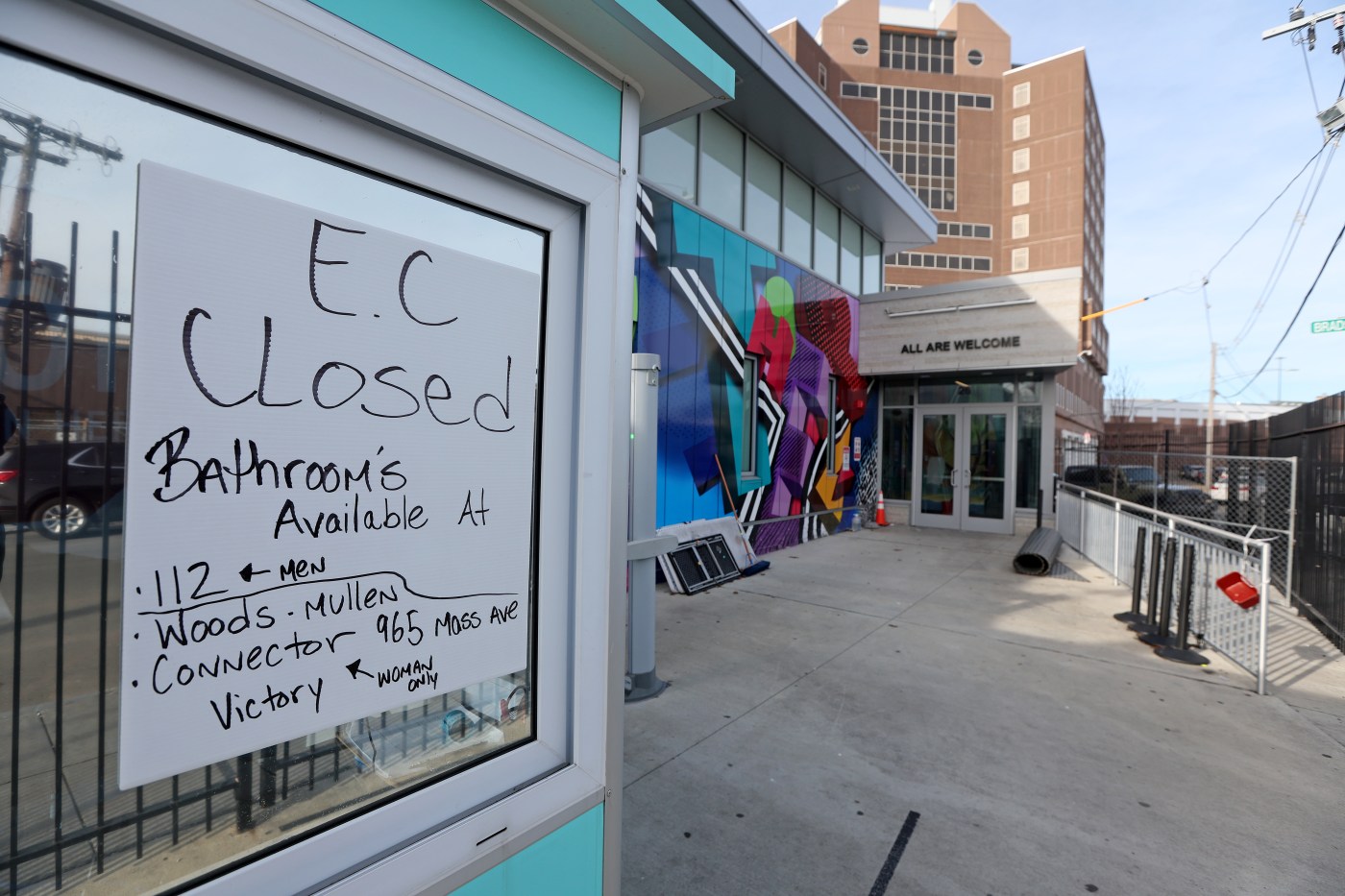
Boston Mayor Wu: ‘No plans’ to return migrant, homeless shelter to addiction outreach amid Mass and Cass spike
Boston’s mayor said there are no plans to transition a building that’s been sheltering migrant and homeless adults for months back into a Mass and Cass addiction outreach center despite the crowds and drug use returning to the area.
Mayor Michelle Wu laid out plans to temporarily convert the former engagement center on Atkinson Street into an overnight shelter in February, at which point a mid-March to mid-April closing date was tentatively set by the city, but she said Wednesday that as “the need has not abated,” there are no current plans to close it.
“The demand and capacity at our individual adult shelters has been really, really stretched,” Wu told the Herald at an unrelated event. “It’s been a combination of more immigrant families arriving, but also adults who are not attached to a family who then don’t qualify for state systems who are in the city-run and community-run beds — and that at certain points has been 25%-30% of those beds.
“So, we’ve had to utilize that space as overflow capacity,” the mayor said. “It’s closed off for general public access.”
The overnight shelter, initially conceived as a way to capture the overflow of homeless and newly arrived migrant adults who had been sleeping on the floor at the 112 Southampton St. men’s shelter, has been “working out pretty well” since it was opened by the city on Feb. 12.
Thirty people are allowed to stay at the shelter each night from roughly 8 p.m. to 5 a.m. the following morning with supervision and staffing from the Boston Public Health Commission, an arrangement that was initially set to last about a month as a way, Wu said at the time, to get “people through the cold.”
“So far, that need has not abated,” Wu said. “We are continuing to monitor the situation, but for now the plan is not to transition back to an engagement center or anything like that.”
A Boston Public Health Commission spokesperson said Thursday that the agency doesn’t currently have a closure date for the overflow, which, while providing relief for the city’s strained shelter system, has also taken away a long-standing resource from the troubled Mass and Cass area — where crowding and drug use is getting worse with the warmer weather, months after the city’s tent crackdown.
The former Atkinson Street engagement center long served as a space for inhabitants of Mass and Cass to receive services, including bathroom and shower facilities, counseling and drug kits, and is listed as “temporarily closed” on a pamphlet outlining six BPHC-run day spaces for the homeless throughout the city.
A BPHC spokesperson said that since the engagement center closed, the agency has also expanded services at the Finland building on Albany Street.
Programming at the building was already shut down prior to its shelter conversion, as part of the mayor’s plan to clean up the area’s open-air drug market and return Atkinson — where she has said “much of the crime and drug use has historically taken place at Mass and Cass” — to a regularly vehicular-trafficked street last fall.
Related Articles
Two arrested, 30 sidelined, some with heat stroke, at Boston Celtics victory parade that drew 1M
‘Time for phase two:’ South End residents call for help with extended Mass and Cass crisis
The tents are gone, but the crowds and drug use are back at Mass & Cass
Boston City Council defeats free museum push for all kids
Boston City Council votes to approve $1.5B school budget over concerns: ‘We have failed our society’
The overflow shelter on Atkinson Street was the second to be opened by the Wu administration as part of the mayor’s plan to tackle crime and homelessness in the Mass and Cass area, which began with a police crackdown and enforcement of a City Council-approved anti-encampment ordinance on Nov. 1.
The first, at another Boston Public Health Commission building at 727 Massachusetts Ave., includes 30 beds and became operational with the caveat that it would also be a short-term shelter option until those individuals were permanently housed.
More than six months later, 727 Massachusetts Ave., a part of the mayor’s plan that proved to be controversial among the South End community, is still operating as “a temporary low-threshold shelter,” the Boston Public Health Commission said.
“The plan for 727 is the same,” a BPHC spokesperson said. “It is a temporary safe sleeping space that will be closed once everyone initially assigned there is on a pathway to permanent housing.”
The scene at Mass and Cass, Boston’s open-air drug market, earlier this month. (Nancy Lane/Boston Herald)

